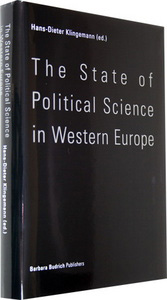 Klingemann
(Hans-Dieter) (ed.) — The State of Political Science in Western Europe
— Opladen, Barbara Budrich Publishers, 2007
Klingemann
(Hans-Dieter) (ed.) — The State of Political Science in Western Europe
— Opladen, Barbara Budrich Publishers, 2007  Klingemann
(Hans-Dieter) (ed.) — The State of Political Science in Western Europe
— Opladen, Barbara Budrich Publishers, 2007
Klingemann
(Hans-Dieter) (ed.) — The State of Political Science in Western Europe
— Opladen, Barbara Budrich Publishers, 2007
Pour en savoir plus sur les contributions et consulter l'index, rejoindre le site de l'éditeur
The authors are renowned political scientists, experts from and for each country. The chapters on European Developments stem from the current president of each of the organisations.
The authors in alphabetical order :
| Kalliope
Agapiou-Josephides Erna Appelt Anne-Sylvie Berck Dirk Berg-Schlosser Sten Berglund Erkki Berndtson Loïc Blondiaux Marleen Brans John Coakley Georges Contogeorgis Yves Déloye Joakim Ekman John Etherington Giorgio Freddi Nicolas Freymond Paul Furlong |
Daniela
Giannetti Michael Goldsmith Wyn Grant Tore Hansen Ólafur Th. Hardarson Hans-Dieter Klingemann Michael Laver Francesc Morata Adriano Moreira Mogens N. Pedersen Christophe Platel Johannes Pollak Jean-Louis Quermonne Bob Reinalda Suzanne S. Schüttemeyer Richard Topf Bernard Voutat |
The study of politics has a long history in Europe . It properly begins with Plato (428-348) and since that time can point to a stream of important contributions aimed at understanding political decision-making taking into account political psychology, political institutions, and the social bases of politics. To trace back and describe substance and geographical distribution of these contributions would be a fascinating enterprise. However, the focus of this volume is not on the past. Instead, it deals with the present state of political science in Western Europe . More precisely, it discusses political science as an academic discipline at the country level in Austria, Belgium, Cyprus, Denmark, Finland, France, Germany, Greece, Iceland, Ireland, Italy, the Netherlands, Norway, Portugal, Spain, Sweden, Switzerland, and the United Kingdom. A comparative description and an account of the state of the discipline at the European level are attempted in the introductory chapter. This comparative analysis is limited to four problem areas: the discipline's institutional base, its degree systems and areas of teaching, its areas of research, and professional communication. Lack of reliable data to compare across time and countries has turned out to be a major problem. There simply is no systematic attempt to generate data which inform about such basic facts as number of students, number of professors, curricula or research programs at the various institutional levels. If this situation does not change it will become difficult for political science to cooperate and to represent its political interests in the European Area of Higher Education and Research.
Academic disciplines need regular stocktaking to assure themselves of their identity and organizational structure. There are two major earlier efforts trying to chart the state of political science in Western Europe on which this volume can build: (1) a report published as a special issue of the European Journal of Political Research in 1991, edited by Kenneth Newton and Josep M. Vallès (" Political Science in Western Europe , 1960-1990), and (2) a 1996 report edited by Jean-Louis Quermonne, entitled "La Science Politique en Europe : Formation, Coopération, Perspectives" (Rapport Final. Projet realisé avec le soutien de la Commission Européenne (DG XII), Paris: Institut d'Etudes Politiques de Paris). The impact of Student unrest, critical theory and the behavioural revolution are characteristic themes of the Newton/Vallès volume. For the Quermonne Report this is true for the increasing dynamics of European cooperation. The consequences of the Bologna Process for the further development of political science as a discipline are the common concern of the current stocktaking in 2006.
The general topic has been high on the agendas of the European Political Science Network (epsNet) and of its predecessor the Thematic Network of Political Science and Public Administration. The theme was most prominently discussed at a Plenary Session dedicated to " Political Science in Europe - A European Political Science ? The State of the Discipline", chaired by Jean-Louis Quermonne, and organized for epsNet's 2005 Plenary Conference in Paris. The current book was made possible by epsNet which provided the authors as well as the infrastructure to discuss and develop the accounts presented in the chapters to follow. This editor was fortunate enough to profit from the good services of epsNet's Paris-based Secretariat and the generous help of its Secretary-General, Ewa Kulesza.
Heartfelt thanks go to Richard Descoings, Directeur de l'Institut d'Etudes Politiques de Paris, and Gérard Grunberg, Sciences Po's Directeur Scientifique, who made it possible for me to work on this project as Directeur de Recherche Associé at Sciences Po from 2003 to 2005. The genius loci of this old and most distinguished academic institution, its wonderful urban campus composed of seventeenth- and eighteenth-century buildings located in the very heart of Paris, has been a constant source of inspiration and helped to bring the project to a good end. For all these reasons I dedicate this volume to Sciences Po, Paris.
Thanks for generous support also go to the Stiftelsen Riksbankens Jubileumsfond (The Bank of Sweden Tercentenary Foundation), Stockholm, and its wise administrator Dan Brändström; to the Marga und Kurt Möllgaard-Stiftung im Stifterverband für die Deutsche Wissenschaft, Essen, and the counseling by Heinz-Rudi Spiegel; as well as to the Wissenschaftszentrum Berlin für Sozialforschung (WZB), where Jürgen Kocka and Dagmar Simon always have an open ear for still another request of one of the WZB's emeriti. These foundations and institutions as well as Barbara Budrich, Gudrun Mouna, Kimberly Sims, and Richard Topf have contributed to the preparation of the manuscript, translation work, and publication. I am deep in their debt. Special thanks are due to Kristina Hartwig, Kenneth Newton and Richard Topf who have critically reviewed the introductory chapter.
Hans-Dieter Klingemann
Berlin, December 2006